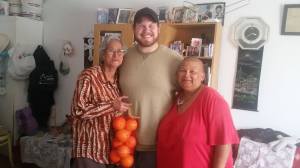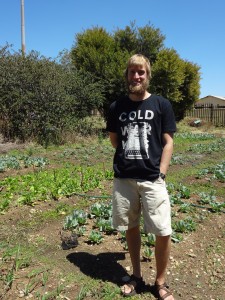Recently, YAGM participant Evan C. was asked at a retreat if YAGM should be called a year of service. Here is a portion of his response:
“Should we call your YAGM year a year of service?”
This seems simple enough, a normal knee-jerk reaction would be to answer yes, but after only a short time of deep thought, I realized that in reality, it was much harder to put a name to what YAGM actually is. To call this experience a year of service seems to sell the program short of what is really happening around the globe.
The YAGM program could be called a year of learning. Our learning started back in April at our Discernment/Interview/Placement weekend (D.I.P.) when we were first taught about the programs model of accompaniment, more on this later. Each day I step out into the community, I am shown something new. I learn more about the Xhosa traditions in the areas that surround me, I learn more about the history of the Colored people and more about the Khoi people from whom some Colored people originate. I learn more every day about what it means to be a white male and how my privilege has sheltered me from many of the realities of real life.
To call the YAGM year a “year of learning,” would again, sell the program short. We are learning every day, but we are doing more than learning, we are experiencing. There are some things that we are seeing that cannot be put into words. At our orientation in Chicago, we even had an hour long session on how to communicate our journey to people back home. Though the session mostly spoke about different social media platforms and ways to write our newsletters, it also tried to help us all understand how to better share our journey, which for many will be misunderstood. So then, should we call this a year of experiencing? We are, after all, experiencing an entirely new world, one that looks drastically different than everything we have known back in the United States. We are experiencing the stories of many people who come from places we could never imagine. We are experiencing the life of people that the world has forgotten about and we are experiencing the roll that we play within their lives. We are also experiencing what it means to be a Christian in a global sense, especially in a program like Southern Africa that is tied so closely with the church.
“YAGM: A Year of Experiencing” doesn’t quite fit the bill either. We are experiencing things, but that sounds like we are just sitting by and watching these things take place, when, in fact, we are living amongst people in our communities and we are sharing our lives with them. So then, maybe we can call YAGM a year of sharing? One of the most powerful ways of communication is story telling. By sharing stories with someone, we can get to know them on a much deeper level. Story telling becomes an invitation to see who a person really is. It is an opportunity to hear where a person is coming from and to hear the life this person has lived. Sharing stories is a way to share culture with people as well. When I hear stories about a Zulu wedding and about the gifts that were presented to the bride and the groom, I get to hear about the culture around marriage in the Zulu tradition. When I share stories about how my dad loves to cook for thanksgiving, I get to share the tradition of celebrating an American holiday with my Zulu family.
“YAGM: A Year of Story Telling” also doesn’t quite seem to fit. It is part of the program, but that title somehow makes it seem like we are constantly drinking tea and eating biscuits while telling stories. We do quite a bit of that here in South Africa, but that’s not everything we do. We do actually work with these people and walk along with them on our journeys. We are accompanying these people in their everyday lives. So then, can we call this a year of accompaniment? That is after all what the YAGM program is modeling. Accompaniment is a wonderful word that carries with it the difficult task of defining what exactly it is. Accompaniment is so much about action that it is exceedingly difficult to define in words. The journey of walking side by side with someone and sharing your life, just as you are, while also listening to another person share their life is close to what accompaniment is.
“YAGM: A Year of Being.” Much of the early part of our year was learning how to just be alive. We had to unlearn the very American way of viewing each day as the opportunity to accomplish something, and learn that each day is the opportunity to live. We are given only so many days, so instead of trying to accomplish something all the time, why not just do what we love? If we spent each day doing something we loved, we would be much happier. I spend each day playing with kids, reading books, and learning more about a culture that is very different from my own. While we spend a lot of time just being instead of doing, that still doesn’t quite match up with what our year is all about. It is a large portion of the year, but not all of it.
YAGMs are considered missionaries, and with that title comes a heavy weight, especially here in Africa. Missionaries have, in the past, come to Africa and told people that they need to change in order to be accepted. The YAGM model attempts to change that idea of what we are as missionaries. We aren’t here to change people, we are here to understand people, to learn more about what is happening in these different corners of the world, and to see new ways in which God is working around the globe. In this way, our communities are serving us, because they are helping to teach us how to better serve our world.
So then, we are back to the original question, should YAGM be called a year of service? Yes, I think it should, but not because we are here to serve the people in our communities, but rather because we are learning how to serve our world through the love and the accompaniment of the people within our communities. Before I left for South Africa, I was so confident about what I had to offer this community. I have been playing music for over 20 years, I have extensive experience with youth ministry, I have outdoor ministry experience, I have ecumenical knowledge about the church, and I know quite a bit about South African history. I felt that I had a lot to offer to this community.
When I arrived in Port Elizabeth, I realized that very little of my experience actually mattered. I thought for sure I could play the music in church, but with almost all of the music here being learned by ear, there was very little I could do for services. The youth operates very differently from the United States, so while I know quite a bit about working with kids, I found that on my own I was completely useless. My knowledge of South African history served me only as far as being able to ask questions. I had read the history from one perspective, and not through the eyes of people who had actually lived it. Books can tell you only so much, the stories of a whole community can change everything you thought you knew. That, for me, is the final piece of accompaniment. Listening louder than I speak and hearing what the world actually needs. If I come into a place and think that I know how to serve these people who are from a very different cultural background from me would be arrogant and doomed to fail. Coming in and listening to these people and hearing the stories and hearing what these people actually need has taught me how to better serve the world.
So, yes, YAGM should be called a year of service, but only because a year of “experience, learning, sharing, story-telling, getting your butt kicked every day, being, realizing you might have some things wrong, living, seeing the world, experiencing God in new ways, and loving” is a little too long to fit onto one small pamphlet. “YAGM: A Year of Service,” only gives a small taste of what the year actually has in store.


